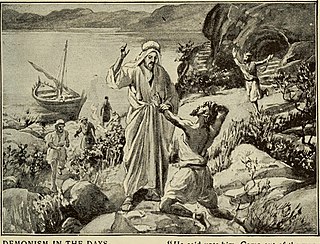Related Research Articles

The miracles of Jesus are proposed miraculous deeds attributed to Jesus in Christian and Islamic texts. The majority are faith healings, exorcisms, resurrections, and control over nature.

Matthew 4:24 is the twenty-fourth verse of the fourth chapter of the Gospel of Matthew in the New Testament. This verse is part of a brief summary of and introduction to Jesus' ministry in Galilee, which will be recounted in the next several chapters. This verse relates Jesus' fame "throughout all Syria" and summarizes his work of healing.
Matthew 12:38 is the 38th verse in the twelfth chapter of the Gospel of Matthew in the New Testament.

Matthew 9:18 is the 18th verse in the ninth chapter of the Gospel of Matthew in the New Testament.

Matthew 8:16 is a verse verse in the eighth chapter of the Gospel of Matthew in the New Testament which relates Jesus exorcising at sunset.
Matthew 9:33 is a verse in the ninth chapter of the Gospel of Matthew in the New Testament.
Matthew 9:34 is a verse in the ninth chapter of the Gospel of Matthew in the New Testament.
Matthew 9:35 is a verse in the ninth chapter of the Gospel of Matthew in the New Testament.

Matthew 8:28 is the 28th verse in the eighth chapter of the Gospel of Matthew in the New Testament.

Matthew 8:29 is the 29th verse in the eighth chapter of the Gospel of Matthew in the New Testament.

Matthew 8:32 is the 32nd verse in the eighth chapter of the Gospel of Matthew in the New Testament.
Matthew 9:32 is a verse in the ninth chapter of the Gospel of Matthew in the New Testament.

Matthew 12:10 is the tenth verse in the twelfth chapter of the Gospel of Matthew in the New Testament.

Matthew 12:13 is the thirteenth verse in the twelfth chapter of the Gospel of Matthew in the New Testament.
Matthew 12:26 is the 26th verse in the twelfth chapter of the Gospel of Matthew in the New Testament.
Matthew 12:27 is the 27th verse in the twelfth chapter of the Gospel of Matthew in the New Testament.
Matthew 12:29 is the 29th verse in the twelfth chapter of the Gospel of Matthew in the New Testament.
Matthew 11:4-6 is a set of verses in the eleventh chapter of the Gospel of Matthew in the New Testament.
Matthew 12:31-32 are two verses in the twelfth chapter of the Gospel of Matthew in the New Testament.

Matthew 12:43-45 is a passage comprising the 43rd to 45th verses in the twelfth chapter of the Gospel of Matthew in the New Testament.
References
- ↑ John MacEvilly, An Exposition of the Gospel of St. John consisting of an analysis of each chapter and of a Commentary critical, exegetical, doctrinal and moral, Dublin Gill & Son 1879.
- ↑ Cornelius Cornelii a Lapide; Thomas Wimberly Mossman The great commentary of Cornelius à Lapide, London: J. Hodges, 1889-1896.
- 1 2 3 4 5 6 7 "Catena aurea: commentary on the four Gospels, collected out of the works of the Fathers: Volume 6, St. John. Oxford: Parker, 1874. Thomas Aquinas".
 This article incorporates text from this source, which is in the public domain .
This article incorporates text from this source, which is in the public domain .